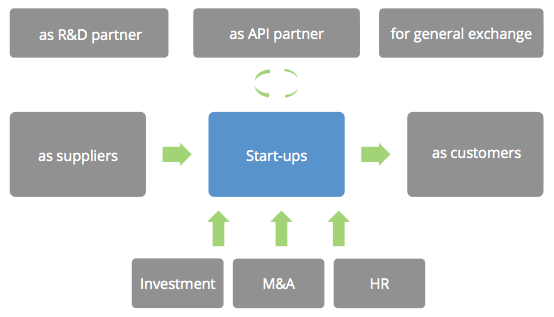How startups and established companies can collaborate and which steps to pay attention to
Developing innovations is the point where the heterogeneous company forms like startups (is an organization formed to search for a repeatable and scalable business model) and established companies face the same problem. Both have to take care to develop new products, processes or business models. While startups often have the chance to think more out of the box, innovative companies have the potential to use their existing resources and customer access. For example, startups do not face internal cannibalization and therefore can think bigger. These heterogeneous strengths of both company forms illustrate why a collaboration of both company forms can be very valuable.
Talking about collaboration with startups it is first of all important to understand each other. This means, the concerned people need to understand the circumstances of each other. As both company forms are so heterogeneous this is often challenging for both sides. For example some buying processes in established companies can take one year which is very difficult for a startup. On the other side, startups don’t have a long history and develop new innovations that are not validated yet (see also Technology adoption lifecycle).
 How to cooperate with startups
How to cooperate with startups
In the second step one can start to identify relevant startups that match the own defined goal. With a clear goal a clear proposal can be created which allows better results. This proposal can range for example from the identification of participants for an event, where the employees of a company can connect with startups and understand startups. Or a more intense cooperation is the identification of a R&D supplier / partner. The format can also differ heavily, for example: startup scouting, startup pitching, innovation competition, an event startup meets established company.
As soon as relevant startups are identified, cooperation forms can be identified and evaluated considering the initial goals. In this phase startups are being evaluated and decisions on specific actions are made. The persons in charge exchange their goals and visions to come up with a cooperation that benefits both sides. These collaborations can take place for example in the form of an initial general exchange, a supplier relationship or a customer relationship as very easy ways to start. Having good experiences with the cooperation, other forms like R&D cooperation or API cooperation become more obvious. In later stages corporate investments, acquisition-hires (so called acqui-hires) or mergers and acquisitions add to the opportunities of cooperation.

Cooperation forms with startups
After finalizing the cooperation form, efforts are focused on executing the cooperation and creating the expected benefits for both sides. Expectation management and an open communication about the goals of both sides play an important role here. The cooperation intensity can differ strongly from a loose cooperation to a strategic cooperation (e.g. Tesla and Daimler). Milestone definition and a code of conduct can be great methods to build a strong fundament for a long-term cooperation. For established companies different startups in a sector can be a challenge if they cooperate with startups that are competing. For intense cooperations also change management support is recommended. Ambi-Vation is your partner for identifying and choosing startups and developing cooperation concepts.
About Ambi-Vation
 Ambi-Vation combines innovative companies and start-ups for innovation partnerships. As an innovation consultancy and matchmaker, Ambi-Vation is pushing the cooperation between established companies and start-ups as part of a general exchange as well as within the scope of concrete customer, supplier and research partnerships. Specifically, Ambi-Vation supports companies in the identification of needs, start-up identification, start-up evaluation and initiation of the cooperation. For this purpose, formats such as the research of relevant start-ups, start-up monitoring, strategic cooperation consulting or event formats such as start-up tours are used. The monthly newsletter also informs curious company representatives about current cooperation examples and events on these cooperations.
Ambi-Vation combines innovative companies and start-ups for innovation partnerships. As an innovation consultancy and matchmaker, Ambi-Vation is pushing the cooperation between established companies and start-ups as part of a general exchange as well as within the scope of concrete customer, supplier and research partnerships. Specifically, Ambi-Vation supports companies in the identification of needs, start-up identification, start-up evaluation and initiation of the cooperation. For this purpose, formats such as the research of relevant start-ups, start-up monitoring, strategic cooperation consulting or event formats such as start-up tours are used. The monthly newsletter also informs curious company representatives about current cooperation examples and events on these cooperations.